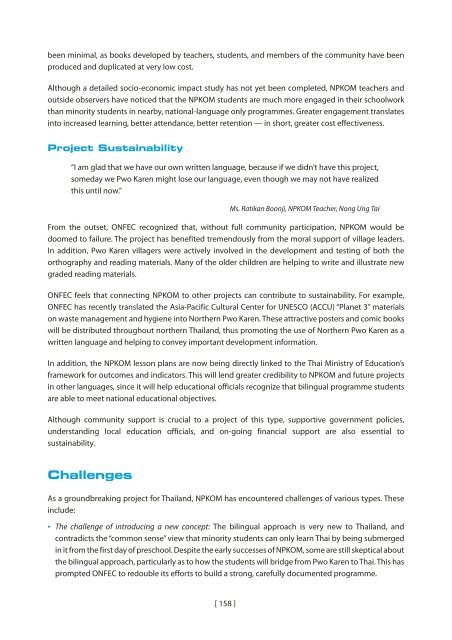Mother Tongue-based Literacy Programmes: Case Studies of Good ...
Mother Tongue-based Literacy Programmes: Case Studies of Good ...
Mother Tongue-based Literacy Programmes: Case Studies of Good ...
You also want an ePaper? Increase the reach of your titles
YUMPU automatically turns print PDFs into web optimized ePapers that Google loves.
een minimal, as books developed by teachers, students, and members <strong>of</strong> the community have beenproduced and duplicated at very low cost.Although a detailed socio-economic impact study has not yet been completed, NPKOM teachers andoutside observers have noticed that the NPKOM students are much more engaged in their schoolworkthan minority students in nearby, national-language only programmes. Greater engagement translatesinto increased learning, better attendance, better retention — in short, greater cost effectiveness.Project Sustainability“I am glad that we have our own written language, because if we didn’t have this project,someday we Pwo Karen might lose our language, even though we may not have realizedthis until now.”Ms. Ratikan Boonji, NPKOM Teacher, Nong Ung TaiFrom the outset, ONFEC recognized that, without full community participation, NPKOM would bedoomed to failure. The project has benefited tremendously from the moral support <strong>of</strong> village leaders.In addition, Pwo Karen villagers were actively involved in the development and testing <strong>of</strong> both theorthography and reading materials. Many <strong>of</strong> the older children are helping to write and illustrate newgraded reading materials.ONFEC feels that connecting NPKOM to other projects can contribute to sustainability. For example,ONFEC has recently translated the Asia-Pacific Cultural Center for UNESCO (ACCU) “Planet 3” materialson waste management and hygiene into Northern Pwo Karen. These attractive posters and comic bookswill be distributed throughout northern Thailand, thus promoting the use <strong>of</strong> Northern Pwo Karen as awritten language and helping to convey important development information.In addition, the NPKOM lesson plans are now being directly linked to the Thai Ministry <strong>of</strong> Education’sframework for outcomes and indicators. This will lend greater credibility to NPKOM and future projectsin other languages, since it will help educational <strong>of</strong>ficials recognize that bilingual programme studentsare able to meet national educational objectives.Although community support is crucial to a project <strong>of</strong> this type, supportive government policies,understanding local education <strong>of</strong>ficials, and on-going financial support are also essential tosustainability.ChallengesAs a groundbreaking project for Thailand, NPKOM has encountered challenges <strong>of</strong> various types. Theseinclude:• The challenge <strong>of</strong> introducing a new concept: The bilingual approach is very new to Thailand, andcontradicts the “common sense” view that minority students can only learn Thai by being submergedin it from the first day <strong>of</strong> preschool. Despite the early successes <strong>of</strong> NPKOM, some are still skeptical aboutthe bilingual approach, particularly as to how the students will bridge from Pwo Karen to Thai. This hasprompted ONFEC to redouble its efforts to build a strong, carefully documented programme.[ 158 ]

















